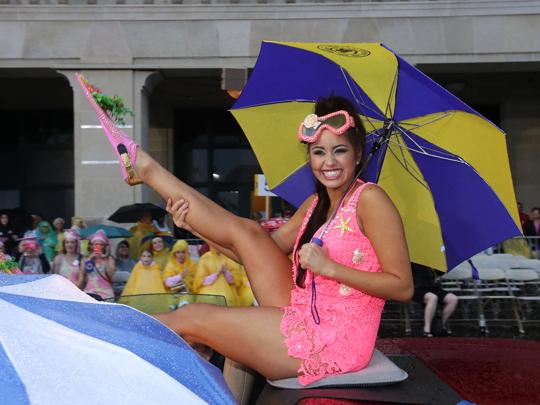How social media usage sometimes makes, or breaks, pageant competitors
When a state titleholder crouches to get a crown placed on her head, it may not look heavy, but the job she embarks on for the next year carries a lot of weight.
Many contestants have deep platforms, ranging from bullying to suicide prevention. The Miss America Organization has increasingly used social media to expose contestants to fans and promote those platforms.
“If you look at the country as it stands today, social media has become such a large part of it. Especially as you look at sports, the Olympics, politics. That’s no different with the Miss America Organization,” said Josh Randle, chief operating officer for the Miss America Organization.
While netting a large audience is generally a positive thing for contestants, all of those eyes often catch the good and the bad.
Destiny Velez, Miss Puerto Rico 2015 who competed when Betty Cantrell was named Miss America last year, was stripped of her title after a series of anti-Muslim posts surfaced on Twitter. The Miss Puerto Rico Organization apologized in a social post.
“Miss Velez’s actions were in contradiction to the organization, and therefore as a consequence of her actions, she has been suspended indefinitely,” the statement said shortly after Velez’s loss of the title in December. “The Miss Puerto Rico Organization will not tolerate any actions or behavior contrary to the Miss Puerto Rico Organization.”
The new Miss Teen USA 2016 Karlie Hay, crowned on July 30, has been under fire recently after series of tweets surfaced that contained repeated racial slurs. The tweets appear to be from her personal account and were made between 2013 and 2014. The Miss Universe Organization released the following statement: “The language Karlie Hay used is unacceptable at any age and in no way reflects the values of the Miss Universe Organization.” The organization, however, has chosen to stand by Hay, stating the organization supports Hay’s “continued growth.” She then appeared on Good Morning America on Aug. 2, offering an apology and telling host George Stephanopoulos that she “was being a follower” when she posted those tweets.
“I was trying to fit in with my friends and the word was thrown around in the music I listened to. I had no guidance,” Hay said.
So how does a contestant walk the line between being accessible on social media, promoting her platform and positively promoting the Miss America brand?
Being prepared for their new social media presence is one of the first steps a Miss America contestant should take, said Maria Simone, of Absecon, an associate professor at the College of Communications and Creative Arts Department at Rowan University.
“While they’re contestants in this pageant, they’re also being tasked with being ambassadors of the Miss America brand,” Simone said. “A lot of brands, whether they’re trying to sell something, an image, an idea, they have protocols for the kinds of things that are appropriate when you’re tweeting on behalf of this brand ambassadorship. Some companies are super loose with it. Very few companies have specific protocols.”
Unlike some companies that require employees to agree to and follow specific social media policies, the Miss America Organization relies mostly on the training that contestants receive in the weeks before the Miss America pageant. A lot of that happens at an orientation session; this year’s occurred in Washington, D.C., in July.
Randle said the contestants undergo training with partners at dick clark productions, which produces the televised Miss America finale, which will be broadcast live at 9 p.m. Sept. 11 on ABC. “It’s more about being able to get our brand out and their individual brands out to our fan base and out to the world,” he said. “Our overarching goal at the Miss America Organization is to empower young women to be whatever they want to be. It’s their voice.
“It’s important to us that, whether it’s Miss America or a state titleholder, that they have a very unique perspective and philosophy that they bring to their role in that year,” Randle continued. “Just as we encourage them to be their true selves during their reign, we encourage them to have their own voice on social media.”
Miss New Jersey 2016 Lindsey Giannini, who occupied the title before this year’s comeptitor Brenna Weick, said many appearance bookings were made based on the exposure she got on social media.
“Social media was a huge part of my year. It was how people saw what I was doing with my year of service and helped me reach more people,” Giannini said. “For me, it was extremely important to hold myself to a very high standard when it came to social media etiquette. I kept my posts positive, and still continue to do so. I also used my social media presence to bring light to certain issues,” she said.
Considering context, Gianinni said, was carefully considered before posting.
“Being a public figure was a big responsibility and you are under a microscope, so I take great care in what goes out for everyone to see,” she said.
Simone said that while contestants are not official paid employees, their titles transform them into brand ambassadors that do receive monetary benefits, in the case of contestants, their scholarship money.
“As a brand ambassador, the first thing you want to do is be very clear about what the expectations are,” Simone said. “I would try to get a sense of frequency you should post. I would get a sense of if there are any areas you should not post about. I would try to find out what those lines are, if there are any.”
Some of this year’s contestants have tried out Facebook Live allowing the public to get to know them prior to the competition. Groups of contestants have posted “fun fact” videos and other similarly themed posts within minutes of each other, each in their own voice but still in a uniform way. Most contestants post at least once a day to their official Miss America Twitter accounts.
Another factor Simone urges contestants to consider is the “digital self.”
“You also have to think about your own brand. We typically don’t think of our own identity as a brand but you need to think about whether these relationships are in compliance with your own sense of who you are,” she said. “For a lot of contestants, there are political implications for a lot of their platforms. I think it’s really important to be true to yourself.”
In recent years, many contestants have found internet issues so important that they’ve made platforms out of online activity. Other issues, like anti-bullying and suicide prevention, also involve the internet.
“Throughout all of our evolutionary changes as a society, there’s been a Miss America there talking about issues that matter to her, that matter to women, and that matter to the country as a whole,” Randle said. “I think that the social media aspect of it, because we’re so relatable, it helps enhance Miss America and our contestants to get their message out to an even greater audience.”
http://www.pressofatlanticcity.com/missamerica/how-social-media-usage-sometimes-makes-or-breaks-pageant-competitors/article_f9912474-657a-11e6-b471-aba1c768d87d.html
Miss America competition
When: Preliminaries Sept. 6 to 8; finale Sept. 11
Where: Boardwalk Hall, 2301 Boardwalk
How much: $23, $38 and $53, preliminary competitions; $23, $78 and $103, finale; $57 to $197, four-night package
More info: Missamerica.org
























































Nenhum comentário:
Postar um comentário